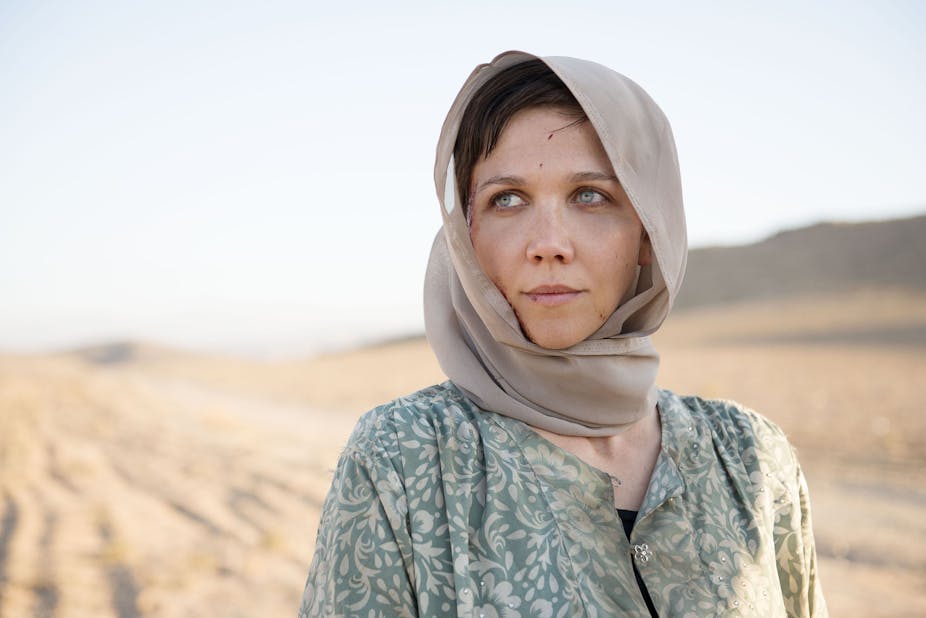As violence flared between Israelis and Palestinians in Gaza recently, a BBC thriller about the conflict, The Honourable Woman, was airing.
It’s a classy, beautifully shot, taut tale of espionage, counterespionage and intrigue, and left many viewers floundering in its labyrinthine plot. Nearly everybody comes in for a bumpy ride: the Israelis, the Palestinians, and the Americans. Given its origins in the UK, it is the British (mostly) who come out as the good guys and the Americans as the baddies.
Between those two poles, the Israelis repeatedly fail to protect a family – the Steins – despite its Zionist background, from kidnapping, rape, assassination, and bombings.
Mossad, Israel’s secret intelligence service, has a reputation for being fearsomely effective, protecting Israelis and Jews far beyond the country’s borders. Such portrayals used to be common, featuring for example in The House on Garibaldi Street (1979) which depicted the capture of top Nazi bureaucrat Adolf Eichmann, and Operation Thunderbolt (1977), about the rescue of hijacked hostages from Uganda.
But The Honourable Woman does not present such an image. Mossad is outwitted by the Americans and is not always in full knowledge of what is happening within its orbit. The fearsome myth of Mossad, then, is not upheld, and the show fits into a wider recent trend in which the reputation of the Mossad secret agent is tarnished.
Portraits of Israelis as suave assassins, villainous diplomats and manipulative undercover agents appeared in 1981 in Eyewitness. But the frequency of such portrayals, and of depictions of Mossad as ineffective, have increased in number much more recently.
In David Mamet’s police procedural, Homicide (1991), Israeli secret agents blackmail and double-cross a Jewish cop despite his assistance. Two ex-Mossad bodyguards assigned to protect Yitzchok in Lucky Number Slevin (2006) fail in their duty and are outwitted and shot dead by a supposedly weak diaspora Jew. You Don’t Mess with the Zohan (2008) pokes fun at the image of the Israeli super-agent who ultimately fulfils his dream by cutting and styling hair, as well as the ex-pat and ex-military Israelis who populate New York City.
Now of course some artistic license is warranted. But when it occurs over and over again you’ve got to question it, particularly as, in the past, Mossad was portrayed as consistently effective and successful.
Steven Spielberg’s Munich (2005) begins and ends with images of the capture and killing of the 11 Israeli athletes at the 1972 Olympic Games, illustrating Israel’s failure to protect its citizens abroad. The counter-assassination team assigned to kill the leaders of Black September, the Palestininan organisation responsible for the massacre, are portrayed as somewhat bumbling and clumsy. They just don’t live up to Mossad’s global reputation.
Mistakes, blunders and errors recur throughout the film. The team are unduly reliant on a shadowy French outfit for their logistics, weapons, intelligence and safe houses. This leads to one particular mix-up when the Israelis and Palestinians share a room for the night. Three of the original five members are killed. Ultimately, the team are ineffectual against the hydra-like rise of terror and, by the end of the film, its leader Avner (Eric Bana) becomes an obsessive paranoid. Convinced that Mossad wants him dead, he rejects Israel, abandons his homeland for the United States, permanently relocating his family to Brooklyn. So this part of the diaspora is the safest haven for Jews, apparently.
Israeli films are even harsher in their depictions. In Walk on Water (2004), Mossad operative Eyal (Lior Ashkenazi) moves from tough to impotent during the course of the film. In the opening sequences we witness him effortlessly assassinate a Hamas leader by injecting him with poison. By the end, literally paralyzed by doubt, he is unable to kill an elderly Nazi war criminal. Compounding his indecision, the killing is carried out by the Nazi’s gay grandson.
And in the British film, The Debt (2010) – a remake of the Israeli Ha-Hov (2007) – three young Mossad agents are sent on a secret mission to capture and kill a notorious Nazi war criminal. When, 30 years later, a man claiming to be that Nazi surfaces in the Ukraine, it’s revealed that not only did they fail in their original mission (the Nazi escapes and permanently scars the heroine) but also that they covered up their failure for three decades.
Of course it must be acknowledged that, at the same time, these agents are presented as sympathetic, and often, attractive protagonists. This is particularly the case of Avner in Munich. But these images impugn the once-sacrosanct notion of Israeli efficiency and suggest that the Mossad agent is not as one-dimensionally tough as presented in the past.
So there is no doubt that Israel, and specifically the Israeli secret service, is suffering on screen. No James Bond or Jack Bauer here. It’s only in relatively recent years that we’ve seen deep divisions open up among Jews across the world, and a decreasing sense of identification with Israel.
So as these trends deepen, and we witness a potentially greater fragmenting of views within the diaspora, and beyond it, it’ll be interesting to see what happens next to the Mossad agent on screen.

